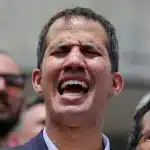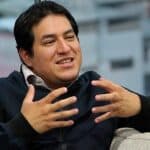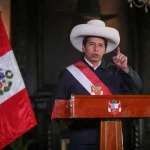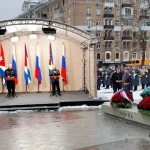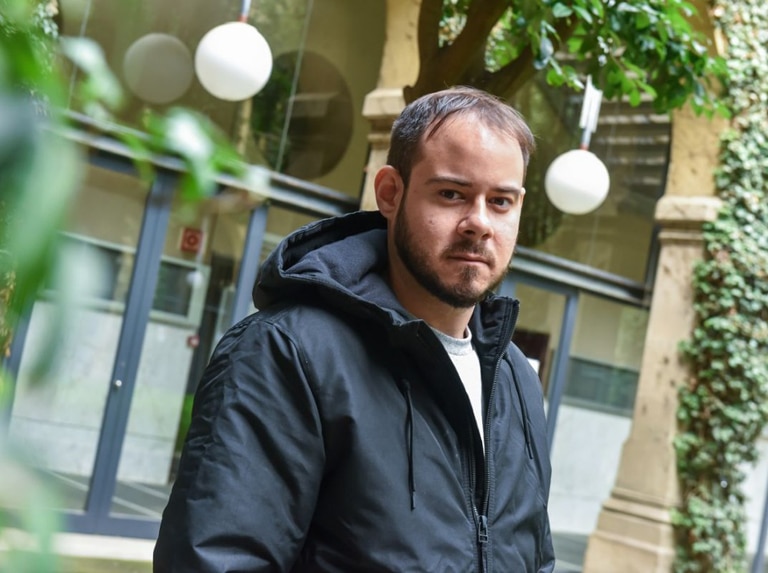
From the Ponent prison in Lleida, Spain, rapper Pablo Hasél spoke to the newspaper Público, as a special feature for Página 12 of Argentina.
The way in which the interview had to be carried out was peculiar for obvious reasons. The newspaper sent a list of questions to his lawyers, and the rapper answered on sheets of paper in his own handwriting. Therefore, there was no room for conversation or replies; it was essentially a questionnaire.
Hasél himself asked that the interview be published in its entirety and without editing, including a question that contained an error in its formulation—as he pointed out to the interviewer, Unidas Podemos asked for a pardon, and not an amnesty, for Hasél.
The rapper’s answers are dated February 26. This is the first interview Hasél has given since his imprisonment.
How is your day-to-day life in prison?
I am strong, although for obvious reasons prison is not a place where you can say that you’re well. I spent a week in quarantine, locked up for 23 hours in my cell, going out one hour a day to a courtyard that can be covered in little more than ten steps. Now I can go out a little more, but it is still the same yard, because they have not moved me from this unit to fight for an individual cell to which in theory we are entitled, and which is historically demanded for political prisoners. I spend the day reading, doing the little sport that can be done in such a small space, writing, and chatting with the few prisoners with whom I be for some time.
What do you do to kill time? Are you composing?
I am writing a book of poems, articles and letters. I am inspired by what I am going through as well as continuing to reflect on the reality outside.
Have you been able to see the protests against your imprisonment? What do you think of them?
I’ve been able to follow some protests and they have moved me, there has been a great response that has even greater value in times of demobilization. They took advantage of this time to imprison me, believing that there would be little response, and it has backfired. The good work of the solidarity movement and my firm attitude have facilitated this, but other factors have added to it, such as the growing weariness with the increasingly widespread misery and repression. The youth without dignified outlets have taken their rage to the streets.
The media have focused a lot on the riots that have taken place in many of these rallies. What is your opinion?
There is a lot of hypocrisy about violence, and the violence in the form of denial of fundamental rights and freedoms is hidden, which is what causes the riots. It’s simple: without such undignified living conditions there would be no riots; without repression there would be no riots either.
The mainstream media of capital criminalize and condemn self-defense but don’t condemn the causes that lead to that reaction.
RELATED CONTENT: Pablo Hasel and Freedom of Speech for Communists
In principle you have entered to serve a nine-month prison sentence. However, you have accumulated new sentences. What prospects do your lawyers give you? Do you think you’ll be able to leave prison in nine months?
We’re waiting to see if they would make me pay the fine of €30,000 with prison time, which would raise it [the sentence] to more than two years; and if other sentences are concluded. I doubt that I will “only” spend nine months in prison and it will depend on the pressure of solidarity, and whether or not it is in their interest for me to be in prison. I’m preparing myself for the worst because anything can be expected from a state like this.
What did you think of the manifesto in your defense signed by artists such as Sabina calling for an end to your imprisonment?
It is positive that heavyweights in the world of art and culture, who have traditionally supported or support this government, have called for my release in defense of freedom of expression. It highlights the extent to which the regime’s practices generate rejection. But even so, they don’t change. In any case, it will be the struggle in the streets above everything else that can win my freedom. Solidarity is much more than signing manifestos.
Some of your public statements make reference to a State operation to imprison you, either in cases opened for glorification [of terrorism] or for those condemning you for aggression. Why do you think the State is persecuting you?
There is a clear State operation to imprison me for a long time, and it is so blatant that it scandalizes people at the international level, or even those who do not sympathize with what I defend. The fact that on the third day of my imprisonment I received another conviction (pending appeal to the Supreme Court) for a police set-up, without evidence, as anyone who reads the entire case can see, makes it obvious.
In addition to having more pending cases such as a hate crime for insulting the Nazi soccer player Zozulya, for which I can get up to four more years, or the six and a half years I may have to serve for attending a demonstration against repression for which, despite not participating in the riots and without any proof, I have been charged anyway.
This State operation is due to the fact that, as the prosecutor recognized, “he is dangerous because he is known, and incites social mobilization.”
As a result of your imprisonment, there has been a lot of debate about you. Do you consider yourself a violent person or a person who calls for violence?
As part of this operation, the media that serve the State have launched a campaign to demonize me with all kinds of insults. These are indeed insults and not objective facts for which I have been imprisoned. I repudiate the violence with which they oppress us and I defend self-defense. That does not make me violent, on the contrary. I love peace and this is only possible with justice. Now, if in the struggle for justice we are attacked, I do not call to stand idly by because that makes it easier for the truly violent to impose barbarism.
RELATED CONTENT: ‘Hasél Case Shows Lack of Freedom of Speech in Spain’
Do words construct reality?
Words can create conscience and therefore struggle. That is why they imprison you just for using words as weapons. They are so cynical that they forbid the use of revolutionary violence when even they do not renounce violence themselves, and afterwards they repress even peaceful struggles.
With the debate in the social networks, critical voices have also emerged regarding some of your old tweets. You have also been labeled a sexist for a tweet of from 2012 in which you encouraged bukake against certain women. Do you regret statements like this?
Within the lynching to undermine my support and portray me as something I’m not, they have dug up tweets from ten years ago with sexist expressions that jokingly or not were a mistake that I have corrected long ago with public and proven self-criticism. We have been miseducated with machismo and absolutely all of us have used macho expressions, but we believe in re-education and what counts is to correct it.
Today there is more sensitivity in this regard. Ten years ago it was more normalized. The disgusting thing is that they resort to the distant, rectified past to attack me, fascists who in the present time say and do worse things, or those who speak as if they hadn’t made mistakes themselves, or that we have no right to correct our mistakes and improve ourselves. I grew up listening to very macho rap from the United States and in my life I fight against that. In the absence of arguments to justify my imprisonment, media that spread the worst machismo, have resorted to that.
Why do you consider yourself a political prisoner?
Clearly I am a political prisoner because I am in prison for a political struggle.
Unidas Podemos has asked for amnesty for you and Valtònyc, and the Ministry of Justice has announced a reform of the crimes of opinion. What expectations do these political movements generate for you?
Unidas Podemos has asked for a pardon, which is not the same as amnesty. Why didn’t they ask for it three years ago when Valtònyc would have been imprisoned had he not gone into exile? Because there wasn’t this response. The Penal Code will only be reformed if the struggle in the streets continues. In France repressive measures have been overthrown by months of more forceful struggle than here.
Days before your entry into prison you stated that you considered the option of going into exile as Valtònyc did. Now that you are in prison, that you have seen the consequences of being imprisoned, do you think you made the right decision by staying in the country?
The answer has shown me again that staying was the right choice for the struggle, although the conditions would have been much less harsh in exile. The State, even if they had not expected so much, knew there would be [a response] and that is why they allowed me to travel abroad, because they wanted me to go into exile to avoid a ruckus in the streets and an international scandal.
Are you surprised by the media coverage of your case once you were sent to prison, in contrast to the relatively little publicity you received during the judicial process?
I’m not surprised that it has been so mediatized because an outrage like this scandalizes everyone except the fascists, which is why they want to cover up the reasons for my imprisonment. What’s more, even some fascists have considered it as excessive.
RELATED CONTENT: Protests Rock Spain for 3rd Night in a Row after Pablo Hasel Detention (Videos)
Do you have a musical project in the short term? Will you self-censor your work to avoid further convictions?
I continue writing songs and I don’t intend to allow them to dictate to us what to write, that’s why they repress us. Freedom of expression cannot be defended with self-censorship.
Anything else you would like to add?
The sewer of sewers represented by [Eduardo] Inda and company have reached the point of using a metaphor of mine in which I say “Illusion is too expensive a tart, I’m going to have to rape her [illusion]” to say that I call for the rape of women!
It’s disgusting and very serious. It sums up the dirty disinformation war to criminalize me, and they have total impunity. If I did this to them I’d get more years in prison.
Featured image: From prison, Pablo Hasél said “there is a clear State operation to imprison me for a long time”/EFE
Translation: Orinoco Tribune
OT/SL/SC
- slorinocohttps://orinocotribune.com/author/slorinoco/
- slorinocohttps://orinocotribune.com/author/slorinoco/March 14, 2023
- slorinocohttps://orinocotribune.com/author/slorinoco/December 8, 2022
- slorinocohttps://orinocotribune.com/author/slorinoco/November 24, 2022
Tags: Barcelona demonstrations Fascism freedom of speech Interview Pablo Hasel Prison protests Repression
Share this:
- Click to share on Twitter (Opens in new window)
- Click to share on Facebook (Opens in new window)
- Click to share on LinkedIn (Opens in new window)
- Click to share on WhatsApp (Opens in new window)
- Click to share on Reddit (Opens in new window)
- Click to share on Telegram (Opens in new window)
- Click to email a link to a friend (Opens in new window)


